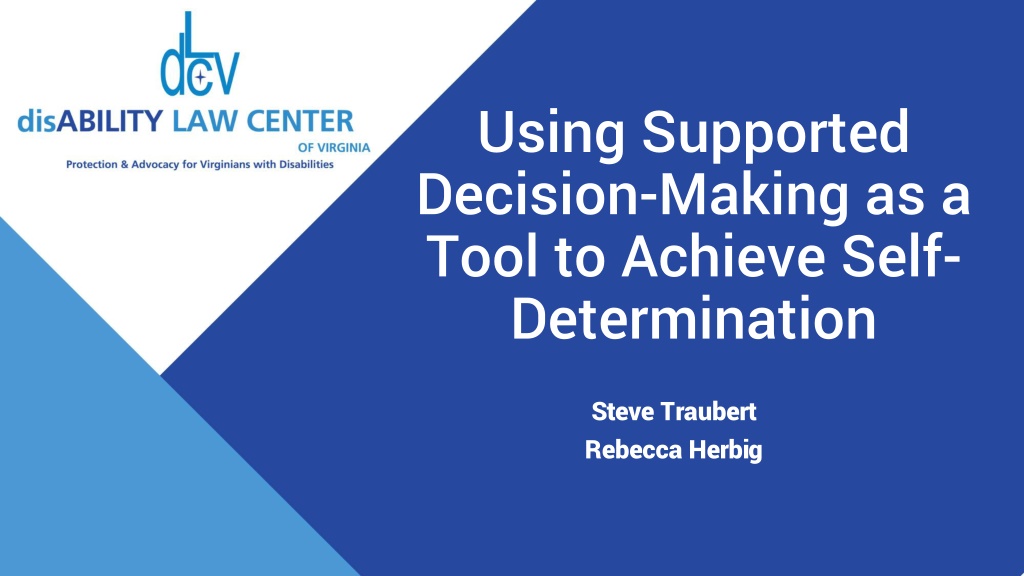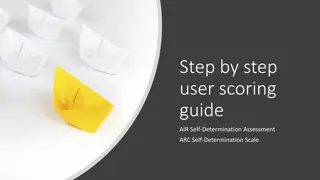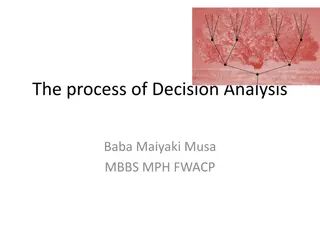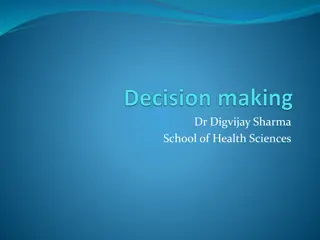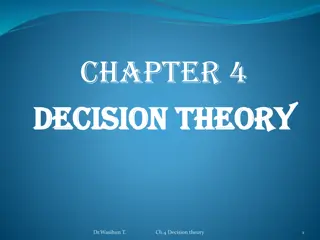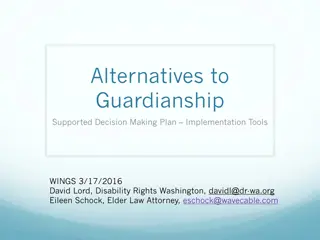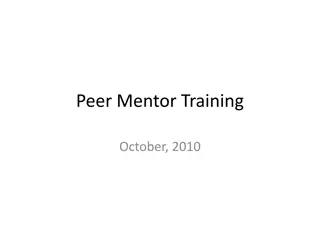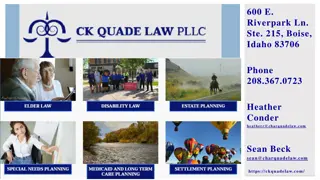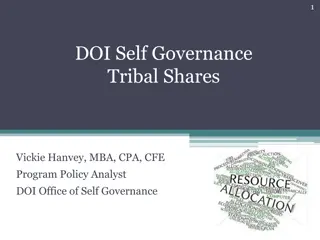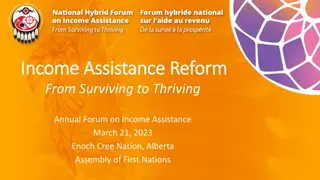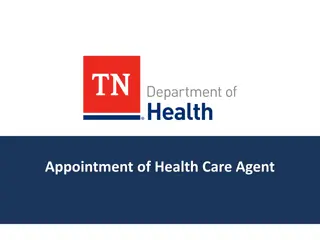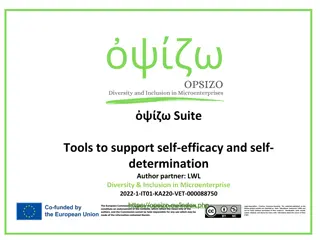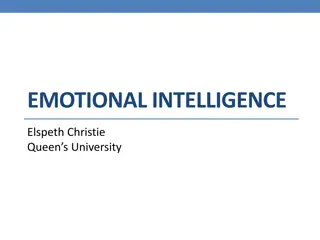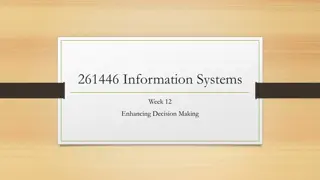Understanding Supported Decision-Making for Self-Determination
Capacity is the ability to process information effectively, make informed decisions, and communicate choices. It can vary over time and situations. Guardianship, a court-mandated solution, limits individual autonomy and decision-making rights. Families may seek guardianship due to various reasons, but it comes with financial, legal, and personal drawbacks. Supported decision-making emphasizes individual choice and self-determination over restrictive measures like guardianship.
Download Presentation

Please find below an Image/Link to download the presentation.
The content on the website is provided AS IS for your information and personal use only. It may not be sold, licensed, or shared on other websites without obtaining consent from the author. Download presentation by click this link. If you encounter any issues during the download, it is possible that the publisher has removed the file from their server.
E N D
Presentation Transcript
Using Supported Decision-Making as a Tool to Achieve Self- Determination Steve Traubert Rebecca Herbig
What is Capacity? The ability to: Take in and effectively process information; Make an informed decision; and Communicate your decision CAPACITY IS PRESUMED!
Capacity is Fluid May have capacity at certain times and in certain circumstances Different levels of capacity: Must specify whether person lacks capacity to make: A particular health care decision A specified set of health care decisions All health care decisions
What Does Guardianship Do? Requires a court order with court oversight court determines capacity Removes the person s freedom of choice, self-determination, and independence Removes some or all of a person s decision-making rights (limited or complete) Assigns decision-making to a third party (the guardian)
What Does Guardianship Do? Expensive attorney s fees and court costs Requires court action to modify or terminate which may cause delay and inconvenience Annual accounting and reports on the condition of the ward
Why Families May Seek Guardianship Family member reaches 18 years of age School or doctor tells them it is necessary Think it is necessary for school, healthcare, or other decisions after age 18 Help their family member handle money Connect their family member with adult services May believe this is the only legal solution unaware of availability or suitability of alternatives to guardianship
What Does Guardianship Do? Takes away basic rights Is the most restrictive choice Involves stigma and humiliation because the person is declared incompetent Is expensive Is often unnecessary Is usually permanent
What Does Guardianship Do? Once declared incompetent, you lose the right to: Make treatment decisions Decide where you live Marry and divorce Vote Enter contracts Make a will or Advance Directive
What Does Guardianship Do? Once declared incompetent, you lose the right to: Revoke a will Drive Possess a firearm Buy, sell, or rent property Decide how your money is spent (conservatorship)
Is Guardianship a Bad Thing? No, guardianship may be necessary and appropriate in some situations, even with appropriate supports: For a person who has never had capacity and will probably never gain capacity For a person who is facing a major decision for which he lacks capacity (limited guardianship should always be considered)
Why are Alternatives Better? Inexpensive Easy to revoke or change Person-centered Allows the person to make their own decisions whenever possible Often done without an attorney Simple ( legalese not necessary)
Important Things to Remember The law presumes all adults have capacity for decision- making this applies to everyone, including people with disabilities Decision-making is a learned skill people with disabilities need opportunity, experience, and support to learn to make well-informed decisions, just like those without disabilities There are other legal ways to assist people with decision- making that do not restrict, limit, or remove individual rights.
What is Self-Determination? Self-determination means making your own choices, learning to effectively solve problems, and taking control and responsibility for one s life Practicing self-determination also means one experiences the consequences of making choices National Parent Center on Transition and Employment, https://www.pacer.org/transition/learning- center/independent-community-living/self-determination.asp
What is Supported Decision- Making?
Underlying Principles There is no one-size-fits-all model Receiving assistance from one or more trusted friends, family members, or professionals to help them understand the situations they face and options they have so they can make their own decisions All of us use supported decision-making regularly when we contact a trusted friend for advice or consult a subject matter expert such as a physician or mechanic for help with a decision The right to make a decision should not be dependent on the quality of any decision made ( dignity of risk )
How Can Supported Decision-Making Help Persons with Disabilities? Understand relevant information, issues, and available choices Focus attention in decision-making Help weigh options Ensure decisions are based on their own preferences Interpret and/or communicate decisions to other parties Salzman, L., Guardianship for Persons with Mental Illness A Legal and Appropriate Alternative?, 4 St. Louis Univ. J. Health Law & Policy 279 (2011).
Virginia Law Guardianship law in Virginia requires the court to consider: The availability of less restrictive alternatives, including advance directives, supported decision-making agreements, and durable powers of attorney. Va. Code 64.2-2007 (2021).
Virginia Law In 2021, Virginia passed a law that requires the Department of Behavioral Health and Developmental Services to develop and implement a program to educate individuals with intellectual and developmental disabilities, their families, and others regarding the availability of supported decision- making agreements.
Virginia Law Supported decision-making agreement: an agreement between a principal and a supporter that sets out the specific terms of support to be provided by the supporter, including: (i) helping the principal monitor and manage his medical, financial, and other affairs; (ii) assisting the principal in accessing, obtaining, and understanding information relevant to decisions regarding his affairs;
Virginia Law (iii) assisting the principal in understanding information, options, responsibilities, and consequences of decisions; and (iv) ascertaining the wishes and decisions of the principal regarding his affairs, assisting in communicating such wishes and decisions to other persons, and advocating to ensure the wishes and decisions of the principal are implemented. Va. Code 37.2-314.3 (2021).
How is it Different from an Advance Directive or Power of Attorney? A supported decision-making agreement is distinct from an advance directive or power of attorney because it does not allow someone else to make decisions for the person. In a supported decision-making agreement, the person with a disability retains the right to make decisions.
How Does a Supporter Assist? Help understand information, options, responsibilities, and consequences of actions Help obtain information, including medical, psychological, education, or other important records Help make appointments for services Help monitor and keep track of information for future or recommended services Help ascertain, communicate, and ensure implementation of the person s preferences and wishes
Choosing a Supporter Supported decision-making means choosing someone you trust to help make your decisions. It can be one person or a group of people. Your supporter can be a friend, family member, or professional. Your supporter should understand your interests, values, and preferences Most people have between 4 and 7 supporters Each supporter can help you make different decisions if you d like
How to Get Started Choose people you trust to help you make decisions Ask them to be your supporter Think about what decisions you need help making and what decisions you don t need help making Create a written plan Contact dLCV to get help: (800) 552-3962. We help draft a limited number of supported decision-making plans each year!
Things to Remember Capacity is presumed Under a supported decision-making plan, only the person with the disability makes decisions We all use supported decision-making on a daily basis Can be simple or complex, transactional or more comprehensive Your supporters should know your preferences and respect your ultimate decision
CONNECT WITH US ADDRESS 1512 Willow Lawn Drive Suite 100 Richmond, VA 23230 PHONE 1-800-552-3962 (toll-free) | 804-225-2042 Spotify Logo Png - Free Transparent PNG Logos Twitter Icon - Royalty-Free GIF - Animated Sticker - Free PNG - Animated Icon Social, media, instagram, circle Free Icon of Social media (color) Icons Facebook icon - Free download on Iconfinder GET HELP dLCV.org/get-help dlcv.org/podcast @disAbilityLawVA @disAbilityLawVA facebook.com/ disAbilityLawVA
